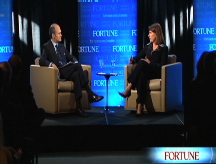'Hedge funds will be decimated'
5 top hedge fund managers testify at congressional hearings about the industry.
WASHINGTON (Fortune) -- A Congressional panel grilled five of the world's richest and most powerful hedge fund managers Thursday as lawmakers sought to understand how much blame they could assign the little-understood hedge fund industry for the global economic collapse.
The managers testifying before the House Committee on Oversight and Government Reform included John Paulson, George Soros, Philip Falcone, James Simons and Kenneth Griffin, a group that made on average more than $1 billion in 2007.
Committee Chairman Henry Waxman said his reasons for holding a hearing were twofold: He wanted these men, "some of the most successful and knowledgeable investors in our financial markets," to discuss how to nurse the financial system back to life. And he wanted the committee to examine how hedge funds contributed to the current financial crisis, whether they pose a systemic risk to the financial system, and how best to regulate the industry, which is now subject to very little oversight.
Noting that we are in the worst financial crisis since the 1930s, George Soros told the committee: "The salient feature of the current financial crisis is that it was not caused by some external shock... The crisis was generated by the financial system itself."
Soros' prepared testimony read very much like an advertisement for his latest book, "The New Paradigm for Financial Markets;" but on the point of how much blame hedge funds should shoulder, Soros was less explicit. He noted that while funds may have helped inflate the bubble, "the bubble has now burst and hedge funds will be decimated."
The hearing is the latest in a series held by Waxman to understand how different players contributed to the global financial collapse. While ratings agencies, bankers and regulators like Alan Greenspan have been blamed by pundits and politicians, the hedge funds have become an increasingly popular villain as the story of the crisis has unfolded because of the mystery and tremendous wealth that are the hallmarks of the industry.
But hedge fund managers have suffered along with the markets, delivering their worst-ever returns this year. The industry has shrunk from more than $2 trillion a year ago to about $1.7 trillion today. Not only have managers lost money amid the credit and equity turbulence, investors have yanked funds out of the industry in order to hold more cash or to protect themselves from further losses.
Even though hedge fund losses have been severe, the industry as a whole is outperforming the broader market. As Houman Shadab, a research fellow at George Mason University, noted in earlier testimony, the hedge fund industry as a whole is down about 15% for the year, while the S&P is down more than 30%.
While few questions were actually answered during the hearing, what was certain was that the industry will face more regulation. Moreover, this push will occur amid an economic downturn that will hit Main Street hard and likely give lawmakers populist support to impose perhaps severe limitations on hedge fund activity or higher taxes.
Massachusetts Democrat John Tierney noted that ever more average investors are exposed to hedge funds as pension funds pour money into the asset class. These investment pools will suffer the same losses as the so-called sophisticated investors (i.e. wealthy individuals and fund-of-fund managers) that hedge funds have traditionally served. Regulation, the committee agreed, will take into account this fact. ![]()
-
 The retail giant tops the Fortune 500 for the second year in a row. Who else made the list? More
The retail giant tops the Fortune 500 for the second year in a row. Who else made the list? More -
 This group of companies is all about social networking to connect with their customers. More
This group of companies is all about social networking to connect with their customers. More -
 The fight over the cholesterol medication is keeping a generic version from hitting the market. More
The fight over the cholesterol medication is keeping a generic version from hitting the market. More -
 Bin Laden may be dead, but the terrorist group he led doesn't need his money. More
Bin Laden may be dead, but the terrorist group he led doesn't need his money. More -
 U.S. real estate might be a mess, but in other parts of the world, home prices are jumping. More
U.S. real estate might be a mess, but in other parts of the world, home prices are jumping. More -
 Libya's output is a fraction of global production, but it's crucial to the nation's economy. More
Libya's output is a fraction of global production, but it's crucial to the nation's economy. More -
 Once rates start to rise, things could get ugly fast for our neighbors to the north. More
Once rates start to rise, things could get ugly fast for our neighbors to the north. More








